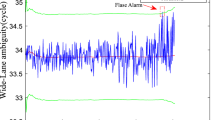Abstract
We develop a new approach for cycle slip detection and repair under high ionospheric activity using undifferenced dual-frequency GPS carrier phase observations. A forward and backward moving window averaging (FBMWA) algorithm and a second-order, time-difference phase ionospheric residual (STPIR) algorithm are integrated to jointly detect and repair cycle slips. The FBMWA algorithm is proposed to detect cycle slips from the widelane ambiguity of Melbourne–Wübbena linear combination observable. The FBMWA algorithm has the advantage of reducing the noise level of widelane ambiguities, even if the GPS data are observed under rapid ionospheric variations. Thus, the detection of slips of one cycle becomes possible. The STPIR algorithm can better remove the trend component of ionospheric variations compared to the normally used first-order, time-difference phase ionospheric residual method. The combination of STPIR and FBMWA algorithms can uniquely determine the cycle slips at both GPS L 1 and L 2 frequencies. The proposed approach has been tested using data collected under different levels of ionospheric activities with simulated cycle slips. The results indicate that this approach is effective even under active ionospheric conditions.









Similar content being viewed by others
References
Baker DN, Ergun RE, Burch JL, Jahn JM, Daly PW, Friedel R, Reeves GD, Fritz TA, Mitchell DG (2002) A telescopic and microscopic view of a magnetospheric substorm on 31 March 20001. Geophys Res Lett 29(18):1862–1865. doi:10.1029/2001GL014491
Bastos L, Landau H (1988) Fixing cycle slips in dual-frequency kinematic GPS-applications using Kalman filtering. Manuscr Geodaet 13(4):249–256
Bisnath SB, Gao Y (2008) Current state of precise point positioning and future prospects and limitations. IAG Symposia 133:615–623
Blewitt G (1990) An automatic editing algorithm for GPS data. Geophys Res Lett 17(3):199–202
de Lacy MC, Reguzzoni M, Sansò F, Venuti G (2008) The Bayesian detection of discontinuities in a polynomial regression and its application to the cycle-slip problem. J Geod 82:527–542. doi:10.1007/s00190-007-0203-8
Goad C (1985) Precise positioning with the global position system. Proceedings of 3rd international symposium on inertial technology for surveying and geodesy, pp 745–756
Kleusberg A, Georgiadou Y, van den Heuvel F, Heroux P (1993) GPS data preprocessing with DIPOP 3.0. Internal technical memorandum, Department of Surveying Engineering, University of New Brunswick, Fredericton, New Brunswick, Canada
Kouba J, Héroux P (2001) GPS precise point positioning using IGS orbit products. GPS Solut 5(2):12–28. doi:10.1007/PL00012883
Lichtenegger H, Hofmann-Wellenhof B (1989) GPS-data preprocessing for cycle-slip detection. In: Proceedings of global positioning system: an overview, IAG Symposium 102, pp 57–68
Liu Z (2011) A new automated cycle slip detection and repair method for a single dual-frequency GPS receiver. J Geod 85(3):171–183. doi:10.1007/s00190-010-0426-y
Liu Z, Chen W (2009) Study of the ionospheric TEC rate in Hong Kong region and its GPS/GNSS application. In: Proceedings of the international technical meeting on GNSS global navigation satellite system—innovation and application, Beijing, China, August 8–9, 2009, pp 129–137
Melbourne WG (1985) The case for ranging in GPS based geodetic systems. In: Proceedings of the 1st international symposium on precise positioning with the global positioning system, Rockville, ML, pp 373–386
Miao Y, Sun ZW, Wu SN (2011) Error analysis and cycle-slip detection research on satellite-borne GPS observation. J Aerospace Eng 24(1):95–101. doi:10.1061/(ASCE)AS.1943-5525.0000056
Wing S, Johnson JR, Jen J, Meng CI, Sibeck DG, Bechtold K, Freeman J, Costello K, Balikhin M, Takahashil K (2005) Kp forecast models. J Geophys Res 110:A04203. doi:10.1029/2004JA010500
Wu Y, Jin SG, Wang ZM, Liu JB (2009) Cycle slip detection using multi-frequency GPS carrier phase observations: a simulation study. Adv Space Res 46(2010):144–149. doi:10.1016/j.asr.2009.11.007
Wübbena G (1985) Software developments for geodetic positioning with GPS using TI 4100 code and carrier measurements. In: Proceedings of the 1st international symposium on precise positioning with the global positioning system, Rockville, ML, pp 403–412
Zumberge JF, Heflin MB, Jefferson DC, Watkins MM, Webb FH (1997) Precise point positioning for the efficient and robust analysis of GPS data from large networks. J Geophys Res 102(B3):5005–5017
Acknowledgments
The financial support from National Natural Science Foundation of China (No: 41004011) is greatly appreciated. The second author is grateful for receiving the support from the Hong Kong Polytechnic University projects 1-ZV6L, A-PJ63, and A-PJ78. The second author also thanks for the support by the Program of Introducing Talents of Discipline to Universities (Wuhan University, GNSS Research Center), China. The International GNSS Service is acknowledged for providing the data used in this study. Three anonymous reviewers and the Editor-in-Chief Prof. Alfred Leick are thanked for their constructive comments to improve the quality of this paper.
Author information
Authors and Affiliations
Corresponding author
Rights and permissions
About this article
Cite this article
Cai, C., Liu, Z., Xia, P. et al. Cycle slip detection and repair for undifferenced GPS observations under high ionospheric activity. GPS Solut 17, 247–260 (2013). https://doi.org/10.1007/s10291-012-0275-7
Received:
Accepted:
Published:
Issue Date:
DOI: https://doi.org/10.1007/s10291-012-0275-7




